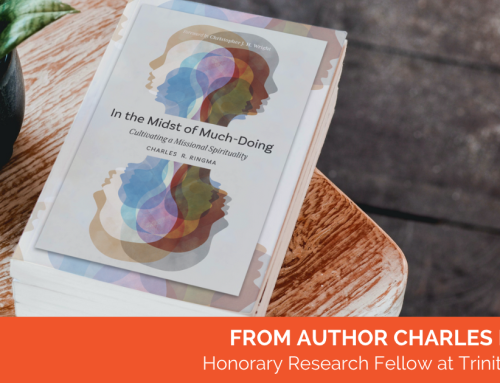How should we disagree over matters of biblical interpretation?
The value of learning irenic approaches to such disagreements extends beyond remaining in fellowship with other ministers or even a denomination. The social dimension to the process of human understanding makes it likely that interpretive disagreements will take place across generational lines within your own family. No one wants to leave a family and so from time to time the Trinity faculty will offer a few thoughts on how to work with others in tackling difficult texts.
I’ve taken the following from R.W.L. Moberly, Prophecy and Discernment (Cambridge University Press, 2006), pp. 249-51. I hope it might provide some support for people working through disagreements over the issue of sexuality. It’s used with permission, though I’ve adjusted the text to read more meaningfully as an excerpt within Trinity News. I hope it’s useful.
Leigh Trevaskis
“There is one topic that can hardly be avoided at the present time—the attitudes of the various churches to ‘homosexuality’[i], both male and female. Yet if honesty requires some mention of the question, wisdom suggests that any contribution in this context to so controverted an issue should be brief.[ii] So I will just say a few things to try to set the issue in context.
First, there can be little doubt that, prima facie, the heated disagreements in the contemporary church over appropriate expressions of sexuality in general and over gay and lesbian issues in particular may make many wonder whether the churches do have what is necessary for discernment. Nonetheless, it is important to set current controversy in a broader historical frame of reference. For controversy of one kind or another has, for better and worse, been a regular feature of the history of the church.
The christological controversies of the fourth century, or the soteriological controversies of the sixteenth century, were even more heated than the controversies of today.
Moreover, it is also important [p. 249] not to harbour inappropriate expectations, as though the fact that God has revealed Himself should somehow mean that Christians should never face uncertainties or disagreements, as though divine revelation were some kind of blueprint for the whole of life. The Bible indeed provides revelatory understanding of God, humanity, and the world that Christians believe to be true, and its content likewise forms the people of God in searching intellectual and moral ways. But the purpose of this is not to ‘solve all our problems’ but rather to enable those who believe to be equipped to tackle the challenges of life in a right and fruitful way.[iii] Learning, understanding, and applying God’s truth in the world is a never-ending task. So the churches will always face challenges of one kind or another in their seeking to discern what constitutes faithfulness to God and biblical revelation in the varied and changing contexts of life. Prolonged controversy over homosexuality may be a sign neither of stupidity nor of faithlessness, but of attempts to be faithful in an area whose true complexity is easily underrated.[iv]
Secondly, the argument of my book focuses upon discernment of purported speech on God’s behalf (i.e. evaluating a person and their message), and it would not be appropriate simply to shift the argument into the related, yet distinct, area of ecclesial decision-making (i.e. deciding moral and social issues of principle).[v] To be sure, one may still expect that in some way there should be ‘prophetic’ input to official ecclesial discernment, not least because penetrative understanding of the true meaning and reality of what is given to the church is by no means straightforward or to be taken for granted. As Luke Johnson (1998:38) has put it:
The teaching office of the church requires the voice of prophecy to be alive if it is not to grow distended: through prophets the living Jesus can speak in new ways. And the preservers of tradition need also to hear the voices of theologians whose task is not so much to preserve as it is to extend the boundaries of our understanding [p. 250] of the mystery of Christ. The tradition is impoverished if the voice of prophecy is stilled.
Yet although one may reasonably ask who are those people within the churches whose quality of life and witness has the kind of prophetic qualities that would give them credibility in this area also, disagreements about some of the moral pronouncements of the late Pope John Paul II underline that even here there are no easy answers. The dynamics of prophetic discernment are a necessary, but not a sufficient, element in the formation of that wisdom which the churches need in their decision-making.
Thirdly, one major danger is that the controverted issue may be invested with an importance that it does not deserve, which is surely what is happening with homosexuality (though the question of how one decides what weight to give to the controversy is not least among the controverted issues). On any reckoning—since the New Testament makes it definitional of the significance of Christ that he displaces divisive human identities for those who believe in him so as to replace them with recognition and reconciliation (e.g. Eph. 2:11-22)—it is not the path of wisdom either for individuals or for churches to define their identity in terms of sexual orientation and practice, any more than it is on issues such as attitudes to warfare or wealth or divorce and remarriage (where Christians recognise not only that they should but that they can, generally, remain in fellowship and communion with those from whom they differ).
Fourthly, another major danger that prolonged ecclesial disagreements pose is a narrowing of focus and vision, that is a diminishing of ability to discern well, related to a diminishing of love. Attempts to discern signs of grace in other Christians, and to hear their witness, can all too easily become displaced by attempts to show that ‘we are right and you/they are wrong’. Too many in different areas of the debate know that they are right, and yet display their rectitude with an attitude of heart that suggests neither grace nor compassion; thereby their discernment and demonstration of the whole counsel of God are seriously diminished.”
Readers may also enjoy Walter’s most recent book, The Bible in a Disenchanted Age: The Enduring Possibility of Christian Faith (Baker Academic, 2018). The books can be purchased online at bakerpublishinggroup.com/bakeracademic cambridge.org/au/academic
[i] I use the inverted commas because the nature of the term used to depict the phenomenon is itself part of the problem.
[ii] I have discussed appropriate use of Scripture in this context in Moberly 2000.
[iii] These last two sentences are a loose paraphrase of the famous statement about Scripture in 2 Tim. 3 16-17.
[iv] One dimension of the complexity is the ‘levitical’ nature of homosexuality (Davis 2003 173-7), which relates it to debates as old as both Judaism and Christianity about what constitutes appropriate holiness of living.
[v] Likewise, I do not wish here to go into the question, well-knownespecially in the Roman Catholic Church, of the relationship between public revelation (i.e. ecclesially recognised, doctrinally normative formulations) and private revelation (i.e. utterances of a particular person, purportedly under the influence of the Spirit), on which see, e.g. Rahner 1963.







